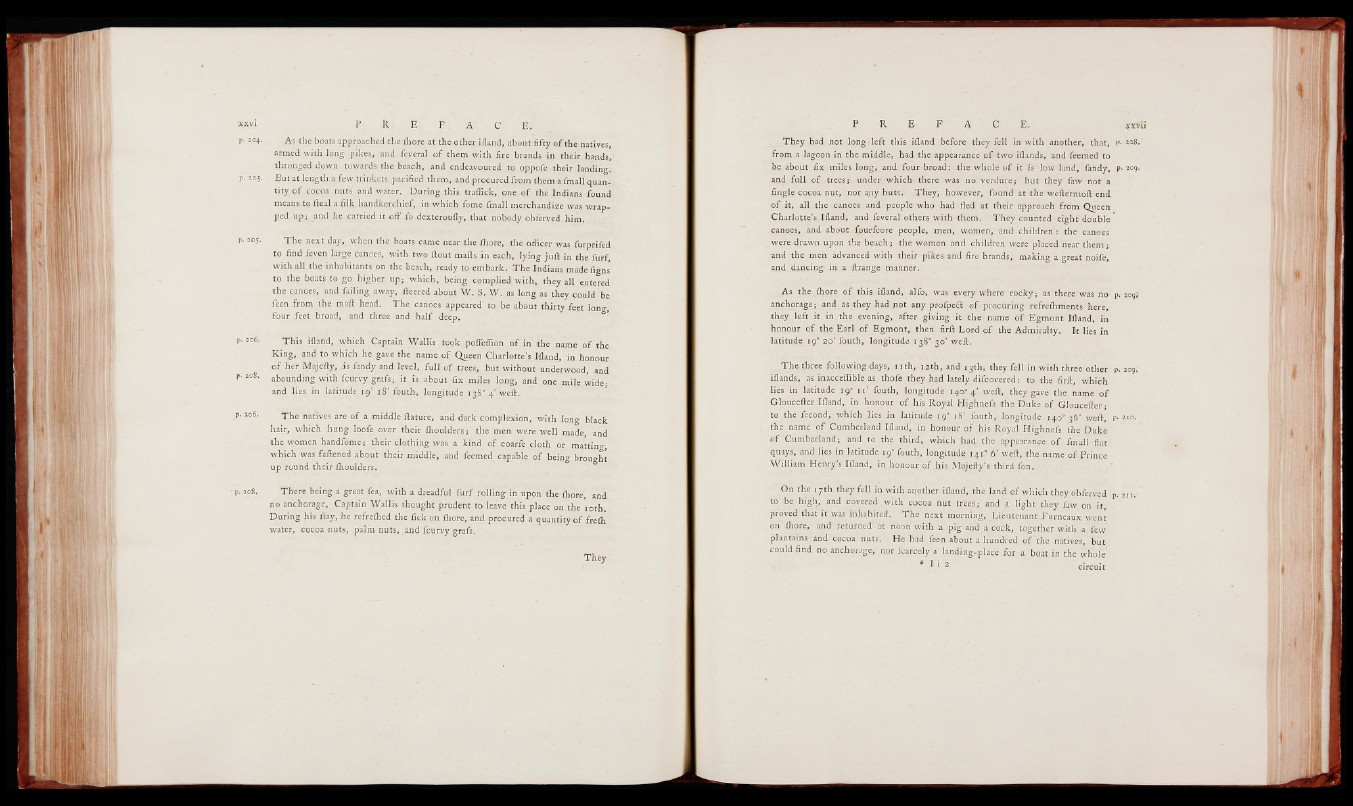
As the boats approached the ihore at the other ifland, about fifty of the natives,
armed with long pikes, and feveral of them with fire brands in their hands,,
thronged down towards the beach, and endeavoured to oppofe their landing.
But at length a few trinkets pacified them, and procured from them a fmall quantity
of cocoa nuts and water. During this traffick, one of the Indians found
means to ileal a filk handkerchief, in which fome fmall merchandize was wrapped
up; and he carried it off fo dexteroufly, that nobody obferved him.
The next day, when, the boats came near the ihore, the officer was furprifed
to find feven large canoes, with two ilout malls in each, lying juil in the furf
with all the inhabitants on the beach, ready to, embark. The Indians made figns
to the boats to go higher up; which, being complied with, they all entered
the canoes, and failing away, fleered about W. S. W. as long as they could be
feen from the mall head. The canoes appeared to be about thirty feet long
four feet broad, and three and half deep.
This iiland, which Captain Wallis took pofieffion of in the name of the
King, and to which he gave the name of Queen Charlotte’s Illand, in honour
o f her Majefty, .is fandy and level, full of trees, but without underwood, and
abounding with fcurvy grafs;. it is about fix miles long, and one mile wide-
and lies in latitude i90 18’ fouth, longitude 138° 4’ weft.
The natives are of a middle ftature, and dark complexion, with long black
hair, which hung loofe oyer their ihoulders; the men were well made, and
the women handfome; their clothing was a kind of coarfe cloth or matting,
which was fattened about their middle, and feemed capable of being brought
up round their ihoulders.
There being a great fea, with a dreadful furf rolling in upon the ihore, and
no anchorage, Captain Wallis thought prudent to leave this place on the ioth.
During his ftay, he refreihed the fick on ihore, and procured a quantity of freih
water, cocoa nuts, palm nuts, and icurvy grafs.
They had not long left this iiland before they fell in with another, that, p* 208.'
from a lagoon in the middle, had the appearance o f two iilancls, and feemed to
be about fix miles long, and four broad : the whole of it is low land, fandy, p-209.
and full of trees; under which-there was no verdure; but they faw not a
fingle cocoa nut, nor apy huts. * They, however, found at the weftermoft end
of it, ail the canoes and people who had fled at their approach from Queen
Charlotte’s Ifland, and feveral others with them. They counted eight double
canoes, and about fourfcore people, men, women, and children: the canoes
were drawn upon the beach; the women and children were placed near them;
and the men advanced with their pikes and fire brands, making a great noife,
•and dancing in a ftrange manner.
As the ihore of this ifland, alfo, was everywhere rocky; as there was no p. aog#
anchorage; and as they had not any profpedt of procuring refreihments here,
they left it in the evening, after giving it the name of Egmont Iiland, in
honour of the Earl of Egmont, then firft Lord of the Admiralty. It lies in
latitude 190 20’ fouth, longitude 138° 30’ weft.
The three following days, n th , 12-th, and 13th, they fell in with three other p. 20g:
iilands, as inaccefiible as thofe they had lately difcovered : to the firft, which
lies in latitude 190 11’ fouth, longitude 140° 4’ weft, they gave the name of
Gloucefter Iiland, in honour of his Royal Highnefs the Duke of Gloucefter;
to the fécond, which lies in latitude 190 18’ fouth, longitude 140° 36’ weft, P* 2.10.
the name o f Cumberland Iiland, in honour of his Royal Highnefs the Duke
ôf Çumberland; and to the third, which had the appearance of fmall flat
quays, and lies in latitude 190 fouth, longitude 1410 6’ weft, the name of Prince
William Henry’s Ifland, in honour of his Majefty’s third/on. ’ , . , ‘
On the 17th they fell in with another iiland, the land of which they obferved p. 211.-
to be high, and covered with cocoa nut. trees; and a light they faw on it
proved that it was inhabited. The next morning, Lieutenant Furpeaux went
on ihore, and returned at noon with a pig and acock, together with a few'
plantains and cbcoa nuts. He had feen about a hundred of the natives, but
could find no anchorage; nor fcarcely a landing-place for a boat in the whole
* I i 9 I •
1 1 * ■ circuit, -